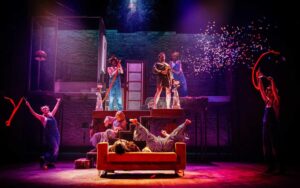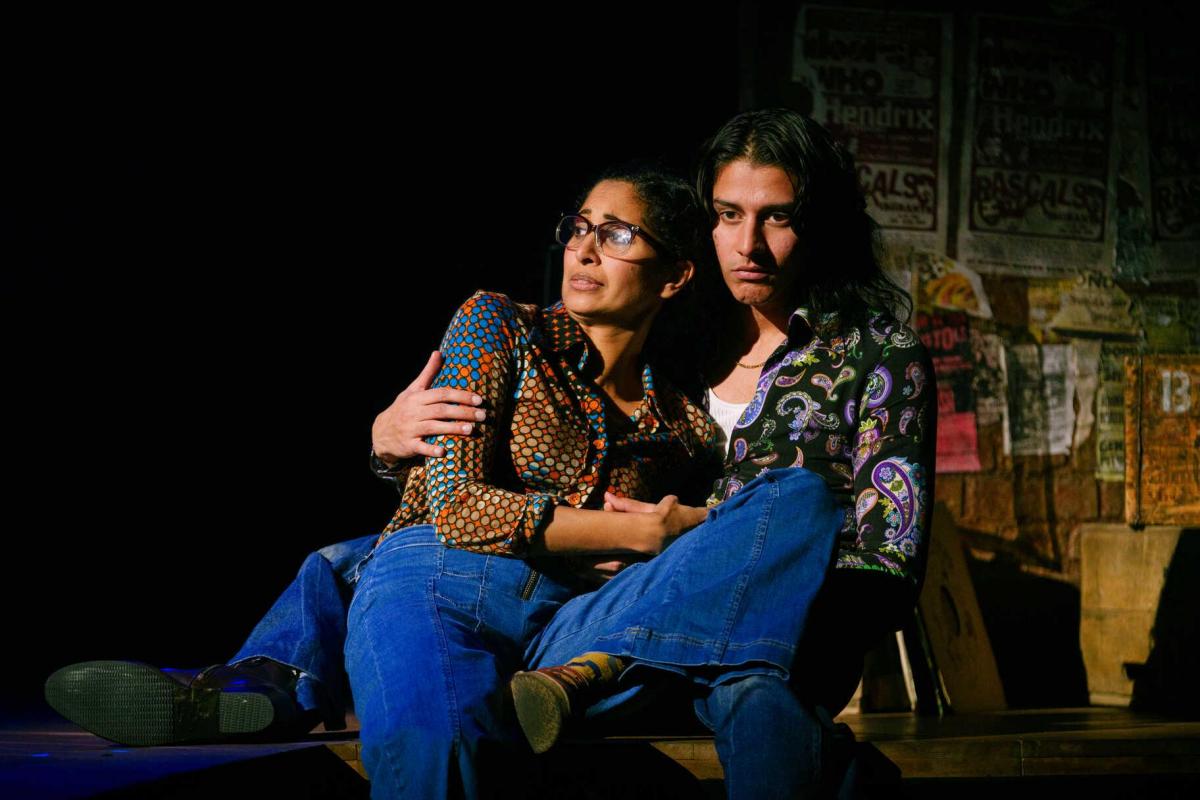Emma Rice’s RSC adaptation of The Buddha of Suburbia proves that the story of Karim Amir, a mixed-race teenager longing for London, still sings. Published as a novel in 1990 to critical acclaim, Hanif Kureishi’s suburban picaresque is a riot of self-discovery and sexual exuberance, glittering with all the uncertainty and excitement of being young. Abounding in graphic sex and verbal rudeness, to Angela Carter it seemed ‘designed on purpose to exclude itself from the Booker short list’—needless to say, she was enchanted.
The play follows young suburbanite Karim (an impeccably cast Dee Ahluwalia) as he tries to make it in the city as an actor in the late 1970s, charting his ascent from a humiliated blacked-up Mowgli to a beaming soap opera star. Along the way, he confronts endemic racism and social stereotyping, paternal infidelity and familial breakup, and escapes into his own affaire de coeur with David Bowie lookalike Charlie (Tommy Belshaw), and when he’s not available, it’s a quick shag at the supermarket with his best friend Jamila (Natasha Jayetileke). It’s a theatrical whirlwind, encompassing a decade of personal growth in just under three hours, with chronological shifts signalled in Vicki Mortimer’s costumes (flares and floral prints give way to tweedy two-pieces), but Rice’s energetic ensemble and pacey script make time fly.
Fidelity to Kureishi’s novel, even at the level of narrative technique, is important to Rice and has made her search for imaginative directorial solutions. For instance, Karim’s warm, conspiratorial first-person voice is realised dramatically through intimate asides and expository speeches. He comes on stage with a microphone and stands in a bright spotlight as if ready to perform a stand-up routine, asking the audience questions and adding to the immersive feel of the whole affair.
The novel’s irrepressible sexual energies are also ingeniously transposed. Eschewing nudity, we are provided with mischievous party poppers that explode into bursts of sexual pleasure. Fruits—bananas, grapefruits, melons—are also on hand, used with Etta Murfitt’s clever choreography to evoke raucous orgies with members of Karim’s theatre troupe. As Changez, the Conan Doyle devotee betrothed to Jamila, exclaims, ‘This whole country has gone sexually insane!’ It’s hard not to agree.

Rachana Jadhav’s layered and multi-purpose set is the transgressive playground for all this action. It contains open windows and closed doors, allowing characters to engage in their illicit activities while others (including the audience) voyeuristically look on. Intermittently, Jai Morjaria’s lighting transitions into sensual purples, oranges, and pinks, chiming with the play’s Bollywood exuberance as disco balls spin in the air.
Enhancing Rice’s theatrical party are Simon Baker’s tongue-in-cheek music choices, from the belting of ‘Tragedy’ by the Bee Gees when Charlie’s suicide is announced to Rose Royce’s ‘Wishing on a Star’ when Jamila and Karim are caught lovemaking by Changez. The play is resolute; it will not take itself seriously. Darker undercurrents are diffused with farce or light-hearted humour, sometimes weakening Kureishi’s commentary on race, class, and sexuality in order to please the crowd.
At its heart, this RSC production of The Buddha of Suburbia, with its meta-theatrical nods and Bacchanalian spectacles, is a joyous love letter to theatre. It foregrounds what Kureishi implies throughout the novel: that we play many different roles in order to find ourselves.
The Buddha of Suburbia
Adapted by Emma Rice with Hanif Kureishi
Director: Emma Rice
Photo credits: Steve Tanner
Cast includes: Dee Ahluwalia; Ankur Bahl; Katy Owen; Lucy Thackeray; Natasha Jayetileke; Tommy Belshaw; Rina Fatania; Naveed Khan; Simon Rivers; Ewan Wardrop; Deven Modha.
Until: Saturday 16th November 2024
Running Time: 2 hours and 30 minutes plus a 20-minute interval

